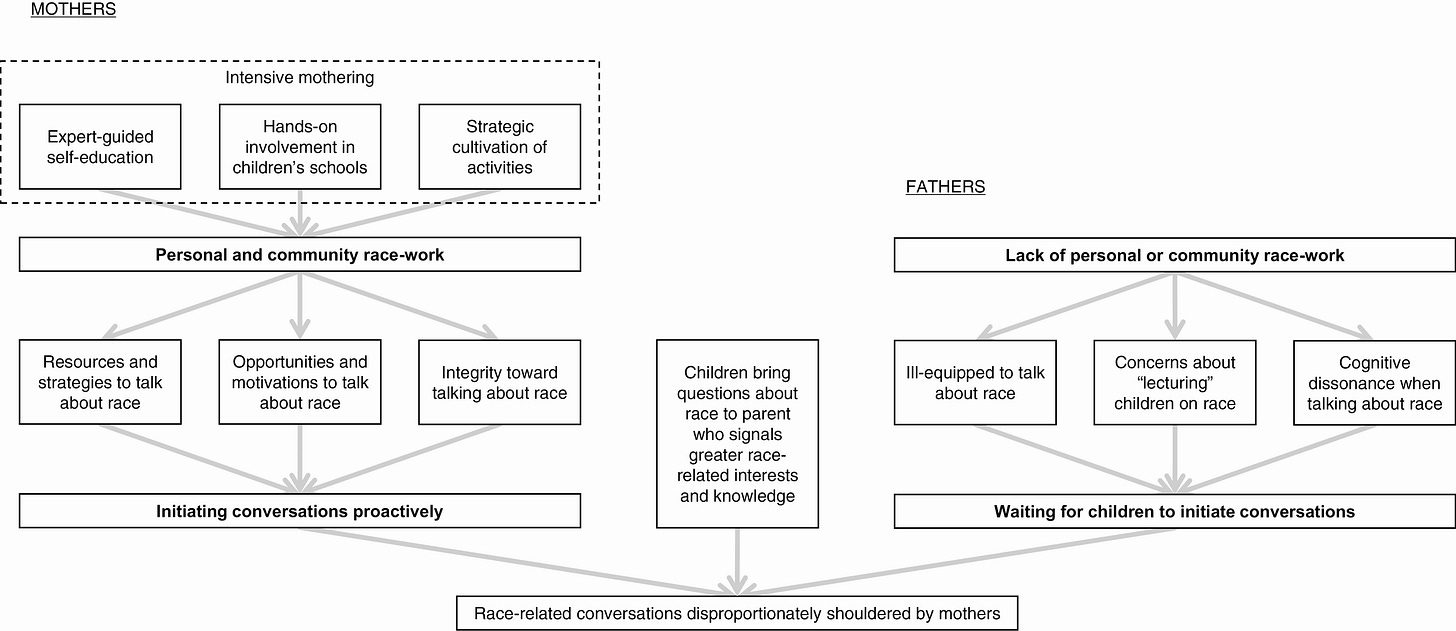Moms are raising antiracists, kids are schooling parents
And more highlights from a year in gender research
Gift guides don’t really do it for me, but man oh man, I love a good year-end “best of” list. My podcast queue and TBR pile currently runneth over, thanks to the myriad end-of-2024 cultural roundups I’ve been mainlining.

In that spirit, here’s a roundup you won’t find anywhere else: four new (or new-to-me) research articles and books that inspired, intrigued, or influenced my thinking over the past year! Because this is totally idiosyncratic, I won’t bother applying the “best” label to these works. Think of this instead as “cool research that caught my eye in 2024 and that I suspect will be of interest to you as a TDD reader.” Less pithy, I know.
The work of raising an anti-racist kid mostly falls on moms
Particularly over the last five-ish years, there’s been a lot of talk about the importance of talking with white kids about race, racial privilege, and white supremacy. Sociologists Reilly Kincaid and Megan R. Underhill interviewed mothers and fathers in different-gender partnerships about how they and their partner talk about racial inequality with their children. Because this was a sample drawn from a particularly liberal community, they found widespread agreement, regardless of gender, about the importance of talking with kids about race. But when it came down to actually having the conversations, moms were the ones leading the way: they tended to initiate most of the race-related conversations with kids, whereas dads took on a much more passive approach and tended to wait for their children to ask questions.
Why I like it: Most obviously, because it uncovers a(nother) hidden source of gender inequality in parenting labor. Imparting moral and ethical values to one’s children is no doubt rewarding, but it’s also hard work, and this paper makes that work salient. I also appreciate that the authors unpack the processes that lead to the gendered behaviors they observed. The full model is diagrammed below, but their basic insight is that intensive mothering norms lead women to disproportionately invest in what they call “personal and community race-work,” which in turn leaves them with more skills and more motivation than fathers to talk with their kids about race. (This dovetails nicely with an argument I make in my forthcoming book about mental labor more generally – stay tuned for more on that in 2025!)

Gender socialization is a two-way street: Gen Z/Gen Alpha are schooling their parents
I’m not sure if you’ve noticed (lol), but the way we collectively talk and think about gender has changed a ton in the past few years alone. That rapid change means kids, with their more flexible brains, are sometimes “ahead” of their parents in adopting new language and concepts (e.g., using the correct pronouns, avoiding assumptions about an individual’s gender). In another interview-based study (I have a type…), sociologist Naomi Darom reports that mothers of cisgender adolescents regularly find themselves “schooled” by their children about shifting community norms vis-à-vis gender. That is, their teens do some combination of a) explaining the “new regime” to their mom (‘Nonbinary means…’), and b) trying to prevent her from committing a gender-related faux pas (‘You can’t say that anymore, mom!’).
Why I like it: The interview quotes describing teens cringing at their parents’ ignorance, and parents really trying (and sometimes failing) to wrap their head around new ways of speaking, are sometimes hilarious—you can almost hear the teen eye rolls—and sometimes really poignant—e.g., “It’s hard to even talk about these things. Because however I talk about it, my kids tell me I’m doing it wrong.” As I venture into my own research on gender socialization, this paper has also been a very helpful reminder to think about kids as active agents rather than just receptacles of parents’ teaching.
America is a “DIY society,” and women are the ones left holding the bag
I reviewed my colleague Jess Calarco’s excellent book Holding it Together earlier this year, but it’s worth shouting out again. Here’s the summary (slightly edited and condensed) I offered in June: “Drawing on hundreds of hours of interviews with mothers, Calarco makes the case that Americans are living in a ‘DIY society’—or at least, the illusion of one: ‘In essence, the US has decided that we can get by without a social safety net because women will protect us instead.’ That choice is not serving women well, Calarco argues. Through a combination of laws, norms, and capitalistic value systems, we push women into motherhood and then into shouldering primary responsibility for anything that goes wrong in their child’s life. Next, we limit their access to affordable childcare and shunt them into low-paying jobs, which further cement their role as primary caregivers. Women with class privilege may be able to avoid the worst of these financial traps, but they are instead forced into moral traps: the only way they can avoid precarity is by becoming complicit in the exploitation of other, more vulnerable women.”
Why I like it: I enjoyed the book quite a bit when I first read it over the summer, but I’ll admit that some parts of it struck me as overly pessimistic. Since then, and particularly in the wake of the recent election, Jess’s take has come to seem sadly realistic; I now think I may have been too optimistic about the extent of social change. On a more personal note, it’s been quite cool to watch Jess engage in “public sociology,” leveraging her research to shape important and ongoing policy conversations at various levels of government. #goals
Is it time to retire the ‘stalled gender revolution’?
In a thought-provoking recent article, sociologist (and UW-Madison alum!) Lisa Wade turns a critical eye on what is inarguably the central metaphor scholars (including myself) use to describe the contemporary state of gender affairs: a “stalled revolution.” The phrase can be traced back to Hochschild’s 1989 book The Second Shift, where she notes that women’s work lives had recently changed a ton (the “revolution” part), but neither men’s family behaviors nor employers’ understanding of workers’ family responsibilities had budged much (that’s the “stall”). Combing the academic literature from the three-plus decades since 1989, Wade finds 1,137 books/papers/etc. that draw on this metaphor in some fashion! She argues that overreliance on this one metaphor blinds us to what’s happening with gender in the 2020s, ultimately “stifl[ing] our imaginations” about how to keep progressing toward some version of gender equality.
Why I like it: I have a soft spot for research that turns a critical eye on concepts I’d previously taken for granted. Wade’s ideas about what’s limited about the stalled revolution metaphor, and the panoply of alternatives she offers, are also just so thoughtful and creative. If you’re into this sort of thing, too, I recommend reading pp. 232-238 in full. But if that’s too much effort, here are a few of my favorite passages: “[The metaphor implies that] after we were well on our way, something inside the revolution broke. Forward propulsion stopped, and we slowly glided to a halt…We need to pop the hood, stall implies, and figure out what is wrong with the revolution’s engine. In this way, the idea of a stall puts feminists in the position of being dutiful mechanics instead of activists with opponents.” As an alternative, Wade asks, “What if the revolution was not stalled but killed?” Or, “maybe the revolution crashed, running headlong into…financialized global neoliberal capitalism”? You get the idea. It’s thought-provoking stuff!
Bonus! If you want to read more about the research I put out into the world this year, take a look at these posts from the archives:
Power plays
Social scientists can be real buzzkills. That thing you enjoy? Yeah, you’ve been conditioned since birth to find it appealing. That experience you found so meaningful, so personal? Tons of people hav…
It's mutual
When we last left our intrepid researchers, they—i.e., Jaclyn and I—were gearing up to study power in marriage. More specifically, we were…
I’ll be back in your inbox/feed just one more time this year, with a more personal reflection on 2024 for paid subscribers. In the meantime, I hope the holidays ahead are festive rather than stressful! And if you are feeling worn-down by all the gendered labor involved in creating “holiday magic,” Mary Catherine Starr, the creator of Momlife Comics, may offer you a moment of catharsis…






